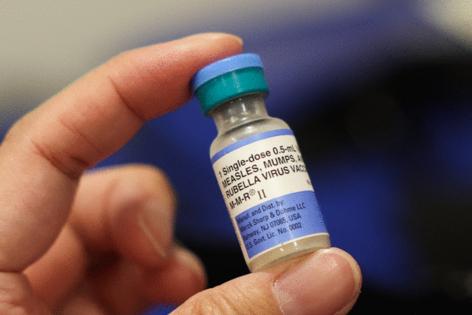Editorial: Canada measles outbreak shows that vigilance must not slip
Published in Op Eds
The next outbreak of serious disease is merely “a plane ride away,” public health officials have long warned. The current crop of measles cases in Canada proves that point.
A traveler infected with measles visited a community in New Brunswick with a low vaccination rate, sparking a national outbreak of the disease in 2024. About 50 people were sickened in that incident, according to the Public Health Agency of Canada.
Meanwhile, others who were unvaccinated visited the community, traveled home and thus the disease spread across a country where conditions were ripe for an outbreak. Vaccination rates have dropped — as low as 50% in some places — and now Canada has logged 5,138 measles cases this year alone. Most were in Ontario and Alberta, but more than two dozen have been reported in British Columbia.
After 12 months of these ongoing infections, The Pan American Health Organization notified our neighbor to the north it has lost its status of having eliminated measles. Public health officials in the U.S. are warning we could be next. (Measles was declared eliminated here in 2000.) Adding to the danger is a new post on the U.S. Centers for Disease Control and Prevention’s website, which revives the debunked idea that vaccines are linked to autism.
Of the Canadian cases, 96% were in people who were not immunized or whose status was unknown. Alberta, one of the hot spots, does not require children to be immunized to attend school; it has reported nearly 2,000 cases since March.
If any of this rings a bell, it should: The outbreak earlier this year in the Southwestern United States included cases that arrived via international travelers and found a place to take hold in communities where vaccination isn’t prevalent. To be clear, the equation is this: an unvaccinated person travels to a place where measles is endemic, flies home and spreads it to the growing group of citizens who are not vaccinated, plus those who are undervaccinated or are too young/immunocompromised and cannot be vaccinated.
Another familiar refrain: We owe the most vulnerable among us the safety of herd immunity against communicable disease. In the case of measles, one of the most contagious diseases around, at least 95% of people in a community need to be vaccinated to prevent outbreaks. With so many people immune, the disease will burn out quickly.
The measles jab, known as MMR for the other two diseases it prevents, mumps and rubella, is safe, long-established and highly effective. It has to be, to stop the relentless march of measles. Two doses of the MMR vaccine are about 97% effective at preventing this disease, which can cause serious complications. All three of the diseases are dangerous to pregnant women and their unborn children, as well as the very young. Children don’t get their first MMR vaccine until 12-15 months of age, leaving them vulnerable; this is why on-time, complete vaccination schedules are so important. Measles may not hurt you, but it could devastate a family.
One area has escaped the outbreak in Canada. The province of Newfoundland and Labrador has not reported a single case of measles since 2017. It’s not a mystery; 98% percent of 2-year-olds there are vaccinated against measles. The province was also way ahead of the rest of the country with its COVID-19 vaccine rates. It’s a small province of about 550,000 people, which makes outreach easier, but it also has a solid culture of vaccine acceptance and an effective visiting nurse system.
Meanwhile, here at home, school vaccination rates among Washington’s K-12 students dropped in 2025 for the fifth consecutive year, and during the 2024-25 school year, only about 89.6% of King County students were up-to-date with required immunizations, including for measles. Given the proximity of the measles outbreak, parents, doctors and public health officials need to work together on communicating clearly and ensuring families keep vaccines current. School districts also must stay vigilant and not admit unvaccinated children without exemptions.
If you haven’t kept up with MMR or any vaccines, please get caught up. Parents, make sure your babies and children get shots on time. If you’re hesitant, your health care provider will be happy to take time and explain the risks (very small) and the benefits (massive) and why they recommend the vaccine schedule. Sadly, the proof is hard-earned.
____
The Seattle Times editorial board: members are editorial page editor Kate Riley, Frank A. Blethen, Melissa Davis, Josh Farley, Alex Fryer, Claudia Rowe, Carlton Winfrey and William K. Blethen (emeritus).
©2025 The Seattle Times. Visit seattletimes.com. Distributed by Tribune Content Agency, LLC.
























































Comments